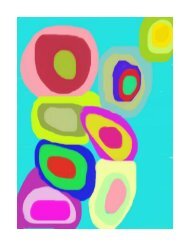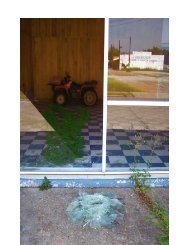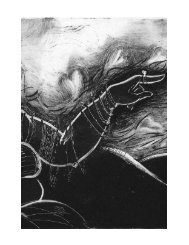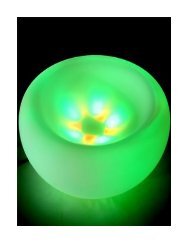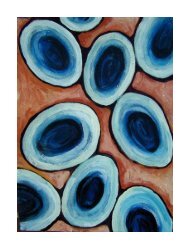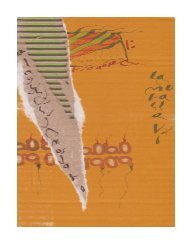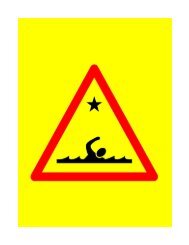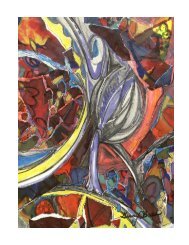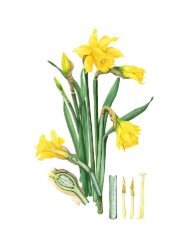Commentaries on Bob Cobbing - The Argotist Online
Commentaries on Bob Cobbing - The Argotist Online
Commentaries on Bob Cobbing - The Argotist Online
You also want an ePaper? Increase the reach of your titles
YUMPU automatically turns print PDFs into web optimized ePapers that Google loves.
However, there is functi<strong>on</strong>al writing which says <strong>on</strong>e thing at a time and as unambiguously as<br />
possible: business letters, instructi<strong>on</strong> manuals, this essay—and, unfortunately, quite a lot of verse.<br />
Of course, to say that <strong>Cobbing</strong>’s poems cannot be reduced to prose statement is not to say that<br />
they are poems without meaning.<br />
On the c<strong>on</strong>trary, their lack of reducibility to statements is a reminder that no poem worth the label<br />
“poem” can be reduced to functi<strong>on</strong>al statements. Prosaic meanings may be extracted; but a great<br />
deal would be lost thereby. As William Wordsworth wrote in 1798:<br />
Our meddling intellect<br />
Mis-shapes the beauteous forms of things:—<br />
We murder to dissect.<br />
Too often, if what has been lost to the main abstracted discourse, by exclusi<strong>on</strong>, is menti<strong>on</strong>ed in the<br />
analyst’s account of their investigati<strong>on</strong>, it, the excluded material, is necessarily rendered as a mode<br />
of decorati<strong>on</strong> because it is seen as not intrinsic. Thus, a poem’s rhyme scheme, rhythmic structure<br />
and other aspects of its versificati<strong>on</strong>, including its form and dicti<strong>on</strong>, are often taught as supporting<br />
the poem’s meaning rather than being part of it, effectively an unsayable part in colloquial terms.<br />
Nowadays, in UK schools, many aspects of poetry are not menti<strong>on</strong>ed adequately in its teaching;<br />
and, widely, poems are liable to be seen as odd or “fun” ways of saying something which is more<br />
clearly said in other ways. <strong>Cobbing</strong>’s Sound Poems str<strong>on</strong>gly suggest that Poetry is a form of<br />
meaning other than “prose meaning”.<br />
<strong>The</strong> mechanism of the poem is different from the approach of the instructi<strong>on</strong> manual or the selfhelp<br />
book, neither of which even attempt what C. S. Lewis called ‘<strong>The</strong> doubling, splitting, and<br />
recombining of thoughts… the counterpoint of the mind, the mastery of doubled and trebled<br />
visi<strong>on</strong>’, [5] which Poetry offers—if we exclude unintenti<strong>on</strong>al ambiguity in manuals et cetera arising<br />
from linguistic incompetence!<br />
Not all will agree with me, but I shall still assert that Poetry c<strong>on</strong>cerns itself primarily with telling<br />
Truth. (This is sometimes far removed from the identificati<strong>on</strong> and uncovering of “truths”, a search<br />
which is almost certainly the hunt for a philosopher’s st<strong>on</strong>e.)<br />
Yet, what a poem says, what we are told by the voice or voices of the poem, may not be factually<br />
true, or not tenable by the lights of the reader. Take, for example, Milt<strong>on</strong>’s 1655 poem ‘On the Late<br />
Massacre in Piedm<strong>on</strong>t’. <strong>The</strong>re is a lot in that with which I disagree; yet I greatly value the poem. It<br />
depends <strong>on</strong> the broadness of the definiti<strong>on</strong> of “truth” that <strong>on</strong>e uses. Something approaching Keats’<br />
much quoted ‘Beauty is truth, truth beauty’ [6] might perhaps be my choice. (That is, there is more<br />
to “truth” than what is deemed to be functi<strong>on</strong>ally useful.)<br />
When a poem includes the word “I” followed by a verb, the reader is ill advised to believe she is<br />
being told something which has happened factually. In a poem, “I walk”, “I love”, “I see” et cetera<br />
are propositi<strong>on</strong>s rather than data about physical behaviour. In the worldview of prose readers, we<br />
might argue that Poetry offers us models of the existential in all its complexity, which becomes<br />
mere tangled complicati<strong>on</strong> if we try to cherry-pick from it.



